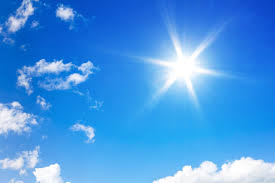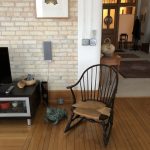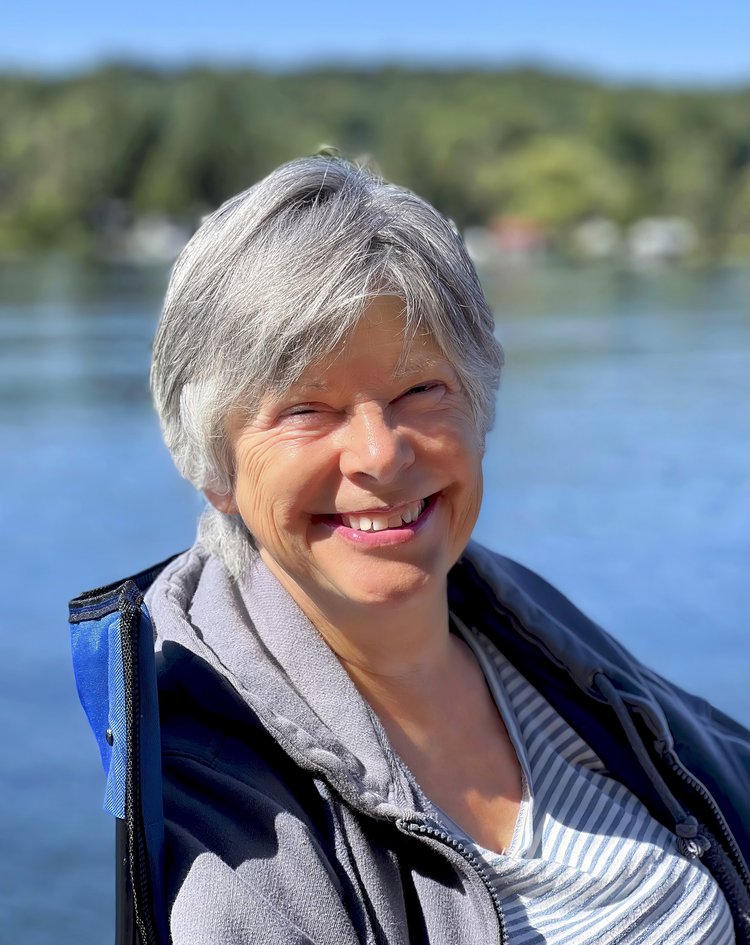 Yesterday we undressed the tree, old ornament by old ornament. We pulled apart the fake tree, bought five or six years ago from Brookstone. It’s held up well and is as pretty as a not-tree can be. We stuffed its million needles with its million lights into its large box, with its layers of duct tape. We put the box on the hand-truck and I pulled it to the elevator and downstairs to the car, where I balanced it so that it would pivot into the back (with the seats down) without having to do much heavy lifting.Jerry would love to help, but can’t. I took it to our storage unit (no storage in this historic building) and reversed the process. Even being careful, my back hurts today. I see this is how it is, you get to be a certain age and things hurt. Just vague aches, so far.
Yesterday we undressed the tree, old ornament by old ornament. We pulled apart the fake tree, bought five or six years ago from Brookstone. It’s held up well and is as pretty as a not-tree can be. We stuffed its million needles with its million lights into its large box, with its layers of duct tape. We put the box on the hand-truck and I pulled it to the elevator and downstairs to the car, where I balanced it so that it would pivot into the back (with the seats down) without having to do much heavy lifting.Jerry would love to help, but can’t. I took it to our storage unit (no storage in this historic building) and reversed the process. Even being careful, my back hurts today. I see this is how it is, you get to be a certain age and things hurt. Just vague aches, so far. Age is interesting. It’s a foreign land that arrives without your having to travel to it. Little things: these spots on my hands, for example. They breed when I’m not looking. My brain processes more slowly. It doesn’t like fast talk. I could go on and you’ll either be saying, oh yes, I know what you mean, or you’ll be saying oh, really? If you don’t live here yet.From here, I can see the arc of my life. As if I were in a spaceship, there is the curvature. Not back to the beginning, but the beginning seems closer, as if I’ve curved far enough to encounter it again. Emily Webb, in Wilder’s play Our Town was able to return and find the same scenes being replayed. That’s not what I mean. I mean I feel closer to the long-gone past. It returns like a reverie. I’m not a character in it; I am both me, now, and my early self that still lives in my bones.Or, you could say I am like a plant that's reached its full height, bloomed its blooms, and is now beginning to remember its roots, its connection to the earth, not so much reaching for the sun.
Age is interesting. It’s a foreign land that arrives without your having to travel to it. Little things: these spots on my hands, for example. They breed when I’m not looking. My brain processes more slowly. It doesn’t like fast talk. I could go on and you’ll either be saying, oh yes, I know what you mean, or you’ll be saying oh, really? If you don’t live here yet.From here, I can see the arc of my life. As if I were in a spaceship, there is the curvature. Not back to the beginning, but the beginning seems closer, as if I’ve curved far enough to encounter it again. Emily Webb, in Wilder’s play Our Town was able to return and find the same scenes being replayed. That’s not what I mean. I mean I feel closer to the long-gone past. It returns like a reverie. I’m not a character in it; I am both me, now, and my early self that still lives in my bones.Or, you could say I am like a plant that's reached its full height, bloomed its blooms, and is now beginning to remember its roots, its connection to the earth, not so much reaching for the sun. I do love the sun. I’m super aware of it, since we moved this far north. And since we moved to this condo with its fourteen windows. I’m aware of it in a primitive way, like the plant. When I was younger, it hung up there in the sky solely for my benefit. It was the tool that would tan me, make my pimples dry up, bleach my hair, and melt my bones if I lay on a towel on the beach long enough.Now we are in collusion. I see now that the sun and I are part of the same system. We're different aspects of the same swirl. I am gradually changing, as is the sun. If you were watching when we both burned out, you would hardly see a difference because (one hopes) it would all have been so gradual. Like these spots on my hands.
I do love the sun. I’m super aware of it, since we moved this far north. And since we moved to this condo with its fourteen windows. I’m aware of it in a primitive way, like the plant. When I was younger, it hung up there in the sky solely for my benefit. It was the tool that would tan me, make my pimples dry up, bleach my hair, and melt my bones if I lay on a towel on the beach long enough.Now we are in collusion. I see now that the sun and I are part of the same system. We're different aspects of the same swirl. I am gradually changing, as is the sun. If you were watching when we both burned out, you would hardly see a difference because (one hopes) it would all have been so gradual. Like these spots on my hands. There’s always a few days of feeling the bareness after the tree and the lights are gone. (Photo is where the tree used to be) Back to the ordinary. But it’s also a relief. One can celebrate only so long. And sometimes even that’s too much. Ordinary life is amazing enough. I’m intensely aware of being alive. Having had cancer does that to you. “Oh, earth,” Emily Webb exclaims towards the end of Our Town, “you’re too wonderful for anyone to realize you.”Speaking of wonderful, Nicholas Kristof’s column in the New York Times this Sunday was titled, “Why 2018 Was the Best Year in Human History. ”He wrote, Each day on average, about another 295,000 people around the world gained access to electricity for the first time. . . Every day, another 305,000 were able to access clean drinking water for the first time. . . Never before has such a large portion of humanity been literate, enjoyed a middle-class cushion, lived such long lives, had access to family planning or been confident that their children would survive.” And, he writes, “The big news that won’t make a headline and won’t appear on television is that 15,000 children died around the world in the last 24 hours. But in the 1990s, it was 30,000 kids dying each day.”What’s the point of this post? I think it’s that there is joy and sadness, kids and old people, and the rotation of the earth around the sun. Good enough?
There’s always a few days of feeling the bareness after the tree and the lights are gone. (Photo is where the tree used to be) Back to the ordinary. But it’s also a relief. One can celebrate only so long. And sometimes even that’s too much. Ordinary life is amazing enough. I’m intensely aware of being alive. Having had cancer does that to you. “Oh, earth,” Emily Webb exclaims towards the end of Our Town, “you’re too wonderful for anyone to realize you.”Speaking of wonderful, Nicholas Kristof’s column in the New York Times this Sunday was titled, “Why 2018 Was the Best Year in Human History. ”He wrote, Each day on average, about another 295,000 people around the world gained access to electricity for the first time. . . Every day, another 305,000 were able to access clean drinking water for the first time. . . Never before has such a large portion of humanity been literate, enjoyed a middle-class cushion, lived such long lives, had access to family planning or been confident that their children would survive.” And, he writes, “The big news that won’t make a headline and won’t appear on television is that 15,000 children died around the world in the last 24 hours. But in the 1990s, it was 30,000 kids dying each day.”What’s the point of this post? I think it’s that there is joy and sadness, kids and old people, and the rotation of the earth around the sun. Good enough?
My Wobbly Bicycle, 163
in Archive
